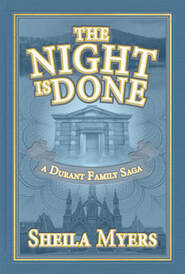
Myers (Castles in the Air, 2016, etc.) continues the story of the Durants in this third book in her Durant Familty Saga trilogy. Thomas C. Durant was a railroad magnate who lost a fortune and died under a cloud—and intestate—in 1885. His son, William, assumed control of the family’s remaining assets and began new real estate and construction ventures in the Adirondacks. His sibling, Ella, who was somewhat of a bohemian, always felt financially shortchanged and ill-treated by her older brother—which caused litigation between the two. In the novel, told in the form of reminiscences of various characters, readers follow the arc of William’s career from his early days as a high roller (starting in 1892) to his impoverished life as an old man (circa 1931). In the end, not only has William lost all of his own wealth, but also money and land that Ella won in her final lawsuit—so they both end up losing. However, as William wrote to a friend in 1932, “I am poor, but I am happy, what more can most of us expect?” Myers writes with skill and has chosen well in deeply researching the Durant saga, which remarkably parallels Greek tragedy. It’s a truly engrossing story, and Myers does it justice. William is effectively portrayed as being more clueless than anything else, as he honestly doesn’t understand that he is treating his sister—and his wife, for that matter—very badly. He’s also obsessed with his camps in the Adirondacks, giving readers the impression that he sees the whole park as his personal fiefdom. That’s likely the reason why Myers uses the very clever gambit of telling the story from the perspective of William in his old age, when he’s “calm of mind, all passion spent,” and being interviewed by wealthy Harold Hochschild, who now owns William’s old camp, Eagle’s Nest. To compare William to the aged Oedipus is not so great a stretch.
A well-wrought, classically inspired riches-to-rags tale.
 RSS Feed
RSS Feed
